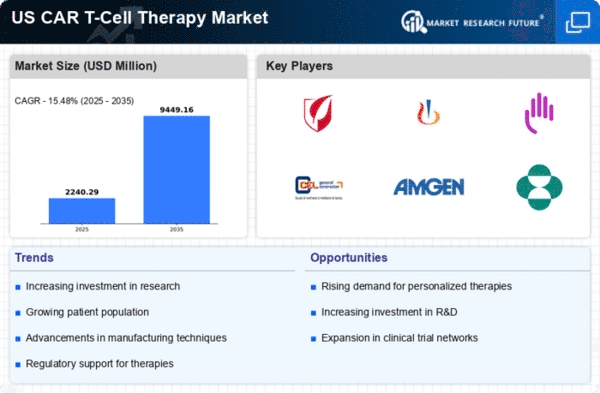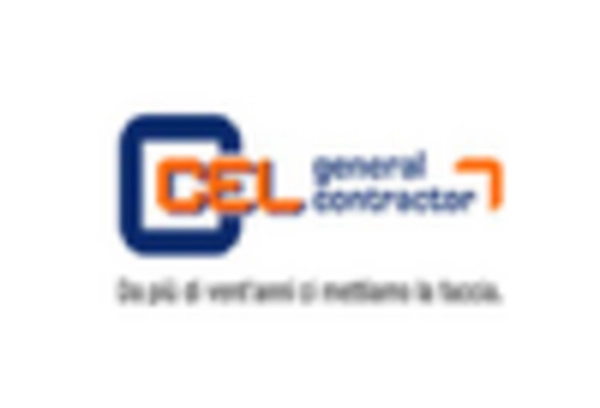Rising Incidence of Cancer
The increasing prevalence of various cancers in the US is a primary driver for the car t-cell-therapy market. According to the American Cancer Society, an estimated 1.9 million new cancer cases are expected to be diagnosed in 2025. This surge in cancer cases necessitates innovative treatment options, including car t-cell therapies, which have shown promising results in treating hematological malignancies. The demand for effective therapies is likely to escalate as more patients seek advanced treatment modalities. Furthermore, the car t-cell-therapy market is projected to grow as healthcare providers aim to offer personalized medicine solutions, addressing the unique genetic profiles of tumors. This trend indicates a shift towards targeted therapies, which could potentially enhance patient outcomes and drive market growth.
Regulatory Approvals and Support
The regulatory landscape plays a crucial role in shaping the car t-cell-therapy market. In recent years, the US Food and Drug Administration (FDA) has streamlined the approval process for innovative therapies, including car t-cell treatments. In 2025, the FDA has approved several new car t-cell therapies, enhancing treatment options for patients with refractory cancers. This regulatory support not only accelerates the availability of new therapies but also instills confidence in healthcare providers and patients alike. The expedited approval pathways, such as Breakthrough Therapy Designation, are likely to encourage further investment in car t-cell research and development. As regulatory bodies continue to support innovation, the car t-cell-therapy market is poised for growth, with an increasing number of therapies entering the market.
Increased Awareness and Acceptance
Growing awareness and acceptance of car t-cell therapies among healthcare professionals and patients are driving the market forward. Educational initiatives and outreach programs have been instrumental in informing stakeholders about the benefits and potential of these therapies. In 2025, surveys indicate that approximately 70% of oncologists are familiar with car t-cell therapies, reflecting a significant increase in knowledge compared to previous years. This heightened awareness is likely to lead to increased adoption rates, as more healthcare providers consider car t-cell therapies as viable treatment options. Furthermore, patient advocacy groups are actively promoting these therapies, contributing to a more informed patient population. As acceptance grows, the car t-cell-therapy market is expected to expand, with more patients seeking these innovative treatments.
Advancements in Research and Development
Ongoing advancements in research and development are significantly influencing the car t-cell-therapy market. The US has seen substantial investments in biotechnology and pharmaceutical research, with funding from both public and private sectors. In 2025, the National Institutes of Health (NIH) allocated over $40 billion for biomedical research, which includes funding for innovative cancer therapies. This financial support fosters the development of new car t-cell therapies, enhancing their efficacy and safety profiles. Additionally, collaborations between academic institutions and biotech companies are likely to yield novel therapeutic approaches, further propelling the market. As R&D continues to evolve, the car t-cell-therapy market may witness the introduction of next-generation therapies that could address current limitations and improve patient outcomes.
Growing Investment in Healthcare Infrastructure
The expansion of healthcare infrastructure in the US is a significant driver for the car t-cell-therapy market. As hospitals and treatment centers enhance their capabilities to deliver advanced therapies, the accessibility of car t-cell treatments is likely to improve. In 2025, investments in healthcare facilities are projected to exceed $200 billion, focusing on state-of-the-art technologies and specialized treatment centers. This investment is expected to facilitate the integration of car t-cell therapies into standard treatment protocols, making them more widely available to patients. Additionally, the establishment of specialized centers for cell therapy is likely to enhance the quality of care and patient outcomes. As healthcare infrastructure continues to evolve, the car t-cell-therapy market may experience accelerated growth, driven by improved access and treatment delivery.
















